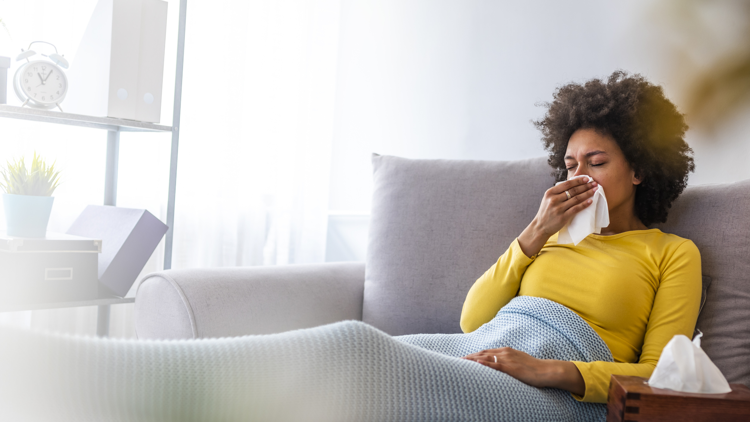This story is sponsored by Geisinger.
Despite claims you may have read or rumors you’ve heard, there are no foods or supplements currently approved by the FDA that will exponentially boost your immune system or protect you against the novel coronavirus.
There are, however, ways you can stay nourished to help your body function at its best — which is key when you’re not feeling well.
Nourishing your body
- Hydrate. Water is one of the body’s most essential nutrients and even mild dehydration can be a stressor to it. The adage of aiming for 8 cups a day is a reasonable goal. For some people, depending on age, gender and activity level, it can be more. There’s no need to consume sports drinks unless you are exercising intensely for longer than 60 minutes.
- Practice food safety. Practicing food safety at home is always important, but handwashing and cleaning all cooking surfaces is especially important in preventing the spread of viruses like the coronavirus. Although there’s currently minimal evidence to suggest COVID-19 is transmitted through food or water systems, sharing food or drinks should be discouraged. Food should be promptly stored or refrigerated and reheated to the proper internal temperature to discourage bacterial growth.
- Use MyPlate to plan meals. The U.S. Department of Agriculture’s (USDA) plate method illustrates what a healthy meal and day would look like if you put all food groups on a plate. Use this to plan your own meals, doing the best you can with what is available to you. Aim for a generous portion of produce along with a whole grain and protein with each meal.
From sick day to road to recovery
Self-care in the form of good nutrition is an important part of your preventative health — but it becomes even more important when you’re ill. First and foremost, if you’re not feeling well and are experiencing flu-like symptoms, such as fever and cough, contact your primary care physician for advice or call Geisinger’s coronavirus hotline at 570-284-3657. You can also check out Geisinger’s Coronavirus Resource Center for other care options, FAQs and frequent updates.
Here are some things to do when dealing with illness at home:
- Avoid directly sharing dishes, drinking glasses, mugs, utensils or other personal dining items with others in your home.
- Keep foods on hand that you can stomach. This can include crackers, pretzels, pudding, Jell-O, cereal, pudding, soup and toast. Bland foods tend to be more tolerable.
- Hydrate. Be even more vigilant about hydration when you’re sick because your body can quickly dehydrate if you have a fever or are losing fluid through sweat, vomit or diarrhea. In this case, sports drinks can replenish lost electrolytes to help your body heal and function. Use a straw to drink so you can sip fluids throughout the day without much effort.
- If you're on a fluid restriction for a medical condition such as congestive heart failure or dialysis, work with your primary care team to determine what fluid intake is right for you.
- Wash your hands with soap and hot water for 20 seconds. If soap and water aren’t available, use hand sanitizer.
Take extra care if you have diabetes
People with pre-existing health conditions, such as diabetes, heart disease or lung disease, may especially be affected by coronavirus and need to follow extra precautions when sick. Of these conditions, diabetes can be especially tricky.
In addition to the above sick-day guidelines, the CDC outlines the further steps that should be taken.
- Managing your blood sugar is critical. This can be difficult if you’re unable to eat properly. You also may need to test more often if you’re sick. A good rule of thumb is to test your blood glucose every 4 hours and keep track of the results. Maintaining a well-written record can help your doctor or diabetes educator accurately adjust your care plan, as needed.
- Continue taking your diabetes medication or insulin as you normally would. If you’re vomiting and having trouble keeping your medication down, contact your primary care doctor.
- You need about 50 grams of carbohydrates every 4 hours. If you can’t eat meals, you can substitute 1-1/2 cups unsweetened apple sauce or fruit juice.
- Drink plenty of fluids. You should drink 4 to 6 ounces every 30 minutes. You may also need to drink beverages with sugar if you’re unable to get 50 grams of carbohydrates through other foods. Just be sure to measure your portions of any sweet beverages to keep your blood sugar from getting too high.
- Weigh yourself every day. Losing weight without trying is a sign of high blood glucose.
- Check your temperature every morning and evening. A fever may be a sign of infection.
- Check your urine for ketones if your blood sugar is high. If you have moderate to high ketone levels in your urine, call your doctor right away.
Emily Newhard is a registered dietitian nutritionist at Geisinger Wyoming Valley Medical Center. For FAQs and helpful resources on coronavirus, visit Geisinger’s Coronavirus Resource Center.
This story is sponsored by Geisinger.



